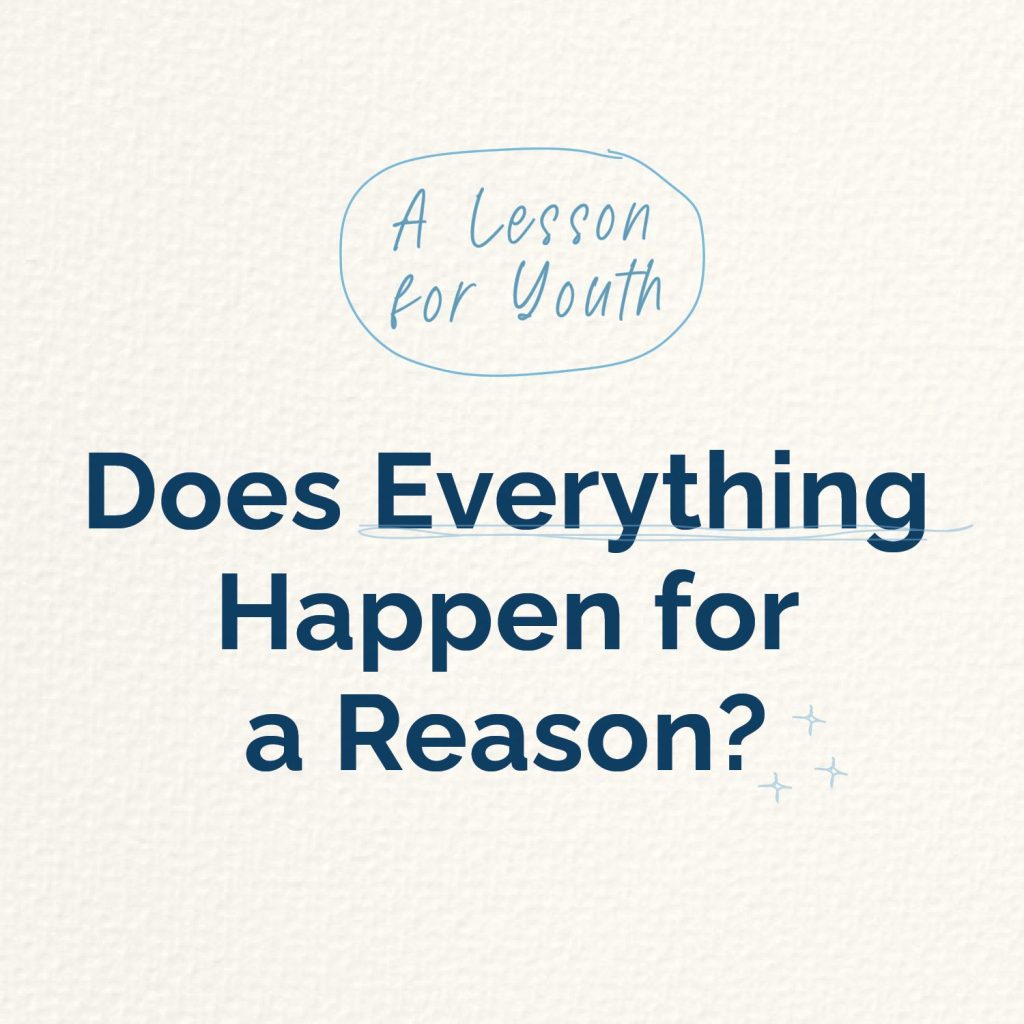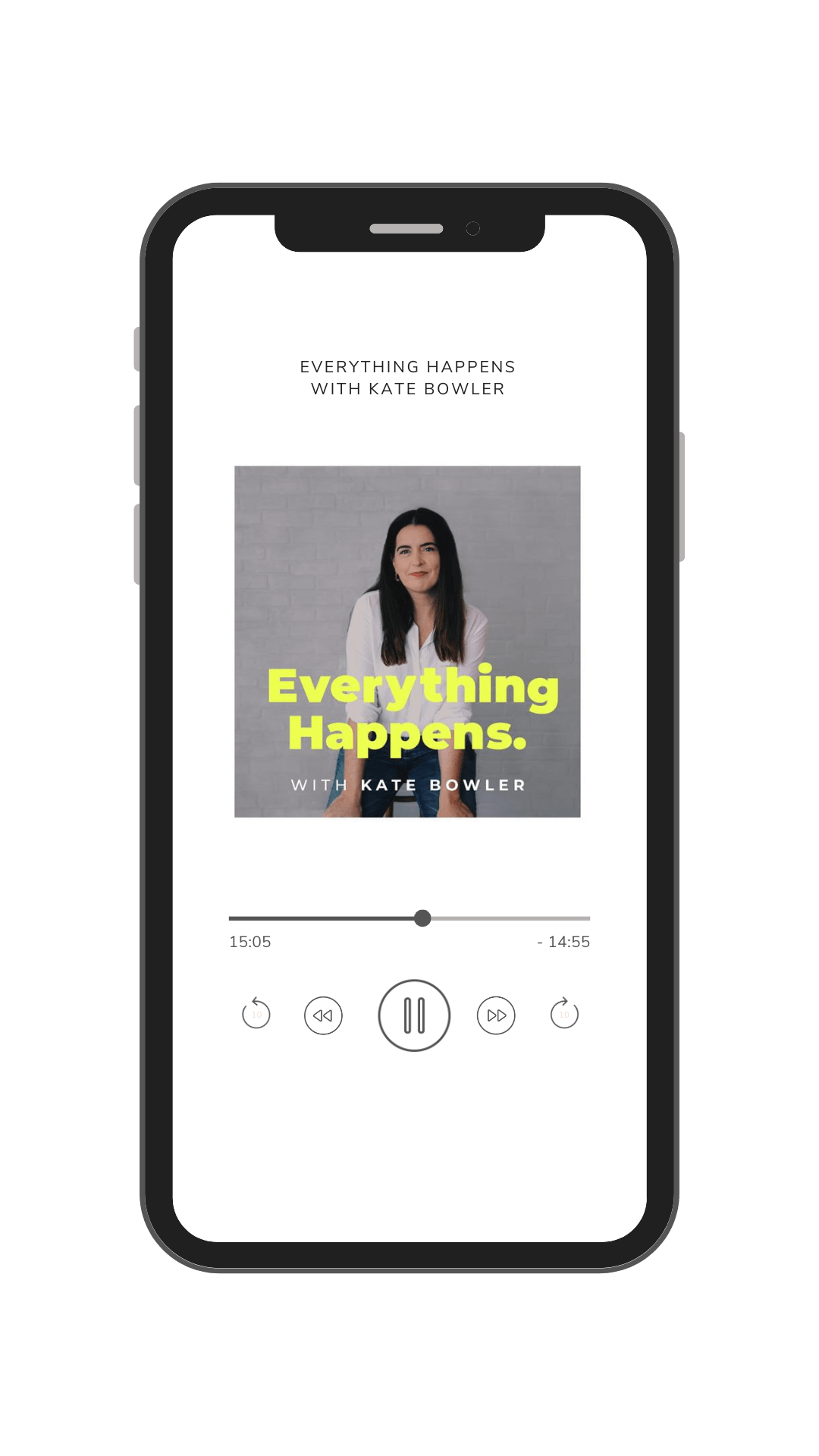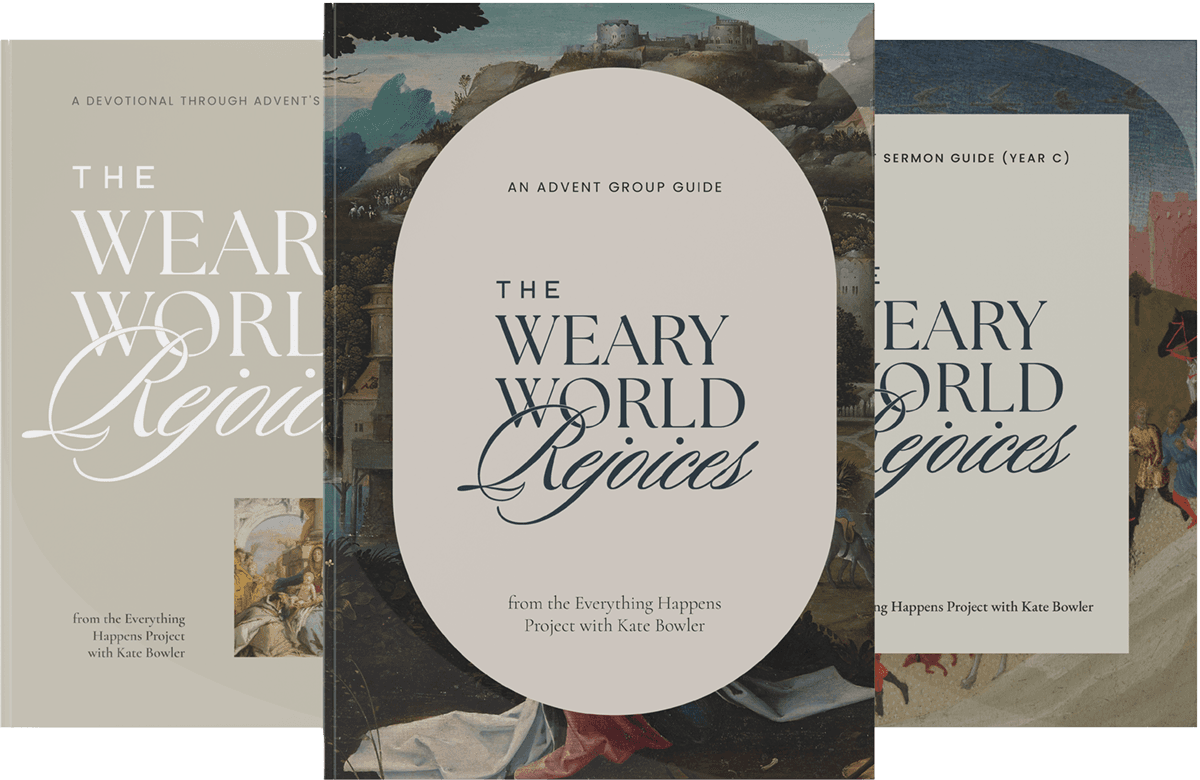Does Everything Happen For A Reason?
A LESSON FOR YOUTH
Use this lesson with your youth in a small group or Sunday school (we suggest 8th-12th graders). This is the first step of a longer conversation about whether, as Christians, we believe everything happens for a reason or not. In this lesson, we start to slightly push against the cultural notion that requires us to find meaning in all tragedy. That being said, this could be a challenging (yet freeing) idea for those who have experienced difficult life circumstances—like the death of someone they love, abuse, or academic struggles. Please be sure to provide a safe place for the youth to explore this topic in a small group with trusted peers and adults.

INTRODUCTION
Duke Professor Dr. Kate Bowler is an expert in the stories we tell about success and failure, suffering and happiness. Kate has been exploring the question, “Does everything happen for a reason?” since she was diagnosed with stage IV cancer at age 35. Centered around Kate’s profound, heartbreaking, and unexpectedly funny TED Talk, this resource offers conversation starters on why bad things happen to good people and how, even during the toughest moments of life, beauty, love, and hope can still be found.
INTRODUCTION ACTIVITIES
Get to Know You Activity: Highs and Lows or Happies and Crappies! (5 min)
Start by asking for each person in your group, or whoever is comfortable, to share the best part of their week and the worst part of their week. We like to call these the happies and crappies.
Pick a Side (10 min)
In this activity, make a line down the middle of the room. This can be a pretend line or made with painters tape or chairs. You can put a “YES” poster to the left of the line and a “NO” poster to the right of the line. Instruct participants that the only thing they have to do in this activity is pick a side. They pick the YES side of the line if they agree with the statement and go to the NO side if they don’t agree.
- Start with an easy one: “TikTok is better than Snapchat.”
Youth who believe that TikTok is better will stand on the left side, and those who like Snapchat better will stand on the right side. - Once the youth have picked a side, add a follow-up question: Pick two people from each side to explain why they like TikTok or Snapchat better.
- Explain to the youth that was an easy one to get us started, but now we are going to get into some deeper questions. So take a moment to really think about your answers.
A Note for Leaders:
Try not to respond with any sentence that starts with “at least…” in an attempt to balance out the hard with the good. Life is made up of so many highs and lows, and God is with us through them all.
- “To be successful in life, you have to make a lot of money.” Yes to the left and no to the right.
Follow-up with a few to explain why they picked their side. - “You should be paid for good grades.” Yes to the left and no to the right.
Follow-up Question: Why or why not should you be paid for good grades? - “You should be punished if you don’t get good grades.” Yes to the left and no to the right.
Follow-up question: Do punishments teach you lessons? Why or why not? - “Good things will come if you work hard.” Yes to the left and no to the right.
Follow-up: What might be something that would get in your way of working hard that may or may not be in your control? (ex: being sick, your internet going out, being overwhelmed, etc.) - “It is your fault when bad things happen in your life.” Yes to the left and no to the right.
Follow-up: Why? Or why not? What is the difference between accidents happening and consequences from choices?
A Note for Leaders:
It’s important to thank the youth for sharing their ideas on these very tough questions and reminding them that there aren’t obvious right or wrong answers. We most likely won’t find all the answers to these questions today. But let’s just start by exploring what we think and why we think that way.
MAIN THEME
Watch a clip from Kate’s Ted Talk (7 min)
A Note for Leaders:
Show Kate Bowler’s TED Talk titled “Everything happens for a reason – and other lies I’ve loved.” If you have the time and a more mature youth group we suggest watching the entire video (14:41 min). If you are limited on time and maturity, you can stop the video at timestamp 7:07.
Discussion Questions (10 min)
A Note for Leaders:
Our hope here is that the group understands that bad things happen to seemingly good people and good things happen to seemingly bad people all of the time. As much as we wish, often there is no reason for why good or bad things happen. Sometimes people get sick or tragedies happen, and it is not because of something people did or the result of bad choices. It is also true that sometimes our choices result in consequences.
- What stood out to you the most from Kate’s story?
- How do you think Kate felt after she found out that she had cancer?
Kate is a professor, and, as she explains, she studies “a form of Christianity nicknamed ‘the prosperity gospel,’ for its very bold promise that God wants you to prosper (or be successful). I never considered myself a follower of the prosperity gospel. I was simply an observer. The prosperity gospel believes that God wants to reward you if you have the right kind of faith. If you’re good and faithful, God will give you health and wealth and boundless happiness. Life is like a boomerang: if you’re good, good things will always come back to you. Think positively. Speak positively. Nothing is impossible if you believe.” - Have you ever heard of the prosperity gospel before this video?
- The prosperity gospel believes, if you pray hard enough, obey well enough, and believe hard enough, God will reward you with health, wealth, and happiness. This concept makes me picture Santa Claus—good people will get good things and bad people will get coal. Do you think that is how God really works? Why or why not?
- How does it make you feel when you can’t figure out why good or bad things happen to people?
A Note for Leaders:
These questions might open up an opportunity for youth to share about how their lives have been affected by tragic moments or disease. It is usually appropriate to respond with something like, “I’m so sorry that happened to you. It makes sense why you would feel that way.”
DIGGING DEEPER
A Note for Leaders:
Sometimes when bad things happen, we ask “Why?” But we don’t always get an answer. We do know that we are not alone in our questions and in our pain. This is such a difficult truth. But it is good for your students to see you asking the hard questions even if you don’t have all the answers.
SCRIPTURE READING (15 min)
People have been wrestling to know if “everything happens for a reason” for centuries. We are going to read a passage from the book of Psalms. Psalms is the book of prayers in the Old Testament written by normal people just like you and me. Let’s see what we can learn from their experiences and where they found God when bad things were happening to them. Can we have three volunteers to read the following verses?
Psalm 23:4—“Even when I walk through the darkest valley, I will not be afraid, for you are close beside me. Your rod and your staff protect and comfort me.” (NLT)
- When you hear this verse, what do you imagine might be an example of the “darkest valley”? What might this person be going through?
- Did you notice that this prayer doesn’t say, “I prayed for you to take me out of the darkest valley and you did!”? This verse says that even though I am in this dark valley, God you are protecting me and comforting me. Why do you think that distinction is important?
Psalm 34:18—“The Lord is near to the brokenhearted and saves the crushed in spirit.” (NRSV)
- What do you notice about the careful wording in this verse?
- Where do we find God?
- Why didn’t God save them before their hearts were broken and before their spirit was crushed?
Psalm 46:1—“God is our safe place and our strength. God is always our help when we are in trouble. So we will not be afraid, even if the earth is shaken and the mountains fall into the center of the sea, and even if its waters go wild with storm and the mountains shake with its action.” (NLT)
Fear is a normal human response to terrifying moments. This is a prayer, written poetically, that helps us to realize that we don’t have to fear that God has left us when earthquakes or bad things happen, but does not promise that God will always stop them from happening. What are some things that you are scared to face alone? How does it feel when you have a friend to help you face your fears?
Reflection Questions (7 min)
- Can you think of a time that you have experienced God’s presence and comfort? Maybe through encouraging words from a friend, or singing in worship, or by talking to God through prayer.
- How does God’s comfort, hope, and love in the midst of hard things show us that God is not like Santa Claus?
- How does it make you feel to know that when things get hard or when bad things happen that God wants to comfort you, to be with you, to take care of you?
CLOSING PRAYER ACTIVITY (6 min)
Give each youth the handout below and direct them to find a comfortable place in the room away from friends and distractions. Tell them to pray this prayer to God by filling in the blanks. Let them know that this is just for God, and you will not be reading what they wrote.


